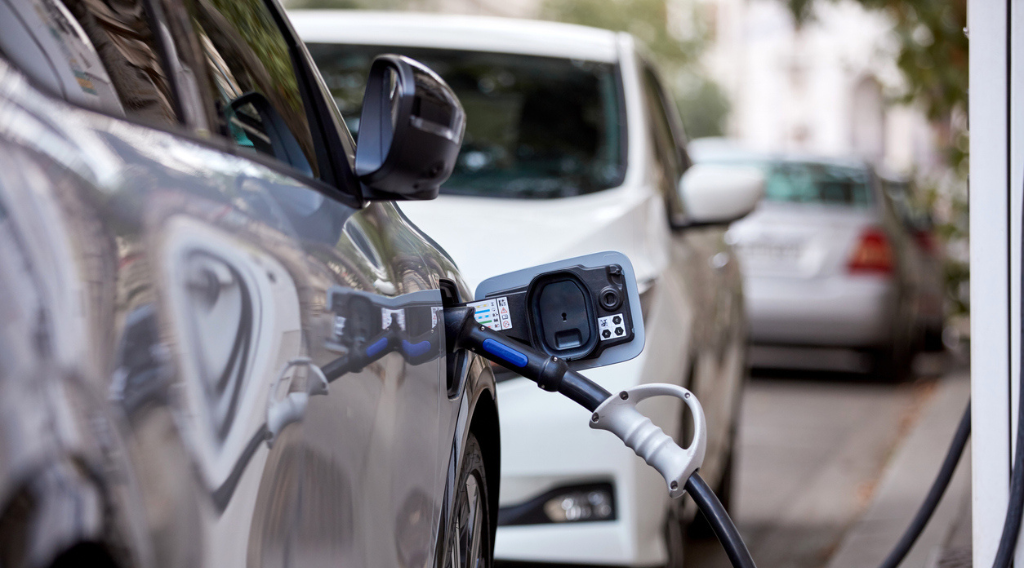
Twenty-eight cities across Minnesota are looking to the future and getting ready for broad adoption of electric vehicles.
Cities Charging Ahead! is a peer cohort of 28 cities working together across Minnesota to explore electric vehicle readiness. Participants receive technical assistance focused on actions and best practices, based on the GreenStep Cities program, that cities can implement to accelerate the adoption of electric vehicles such as:
- including electric vehicles in city purchasing plans
- installing electric charging infrastructure in public parking areas
- providing guidance on electric vehicle-ready development in the private sector
Cities Charging Ahead! is led by the Great Plains Institute and Clean Energy Resource Teams (CERTs). Funding is provided through the Carolyn Foundation, Energy Foundation, and in partnership with Xcel Energy, which provides support and resources in line with the company’s long-term clean energy plan to electrify transportation.
Most of the cities participate in a regional cohort that meets every other month for three–hour in–person meetings with others in their area to learn, share, and discuss their questions, needs, resources, challenges, and opportunities. Each regional cohort chooses the topics they want to cover. The Twin Cities metro region began with fleets, while the Southeast started with energy, climate, and comprehensive planning. The Northeast cohort just met for the first time in August 2018 and are still determining the direction they want to pursue. There are 16 cities in the metro cohort, four in the Northeast, and five in the Southeast, with three additional cities in Greater Minnesota.
In addition to in-person meetings, Great Plains Institute has hosted two webinars. The first focused on an overview of the project and GreenStep Cities best practices while the second focused on electric charging and charging stations. The third and most recent webinar focused on electric vehicle (EV) readiness in private development.
Webinars are open to interested parties outside of the participating cities and provide an opportunity for other collaborators to learn about the project and its EV efforts. Cities Charging Ahead! (CCA) not only works to provide information, resources, and technical assistance to its members, but also to give them the tools they need to educate others in their communities about EV readiness. Metro cohort members elected to spend a portion of their in-person meeting on September 6 dedicated to ‘training’ the members, so they feel prepared to educate their colleagues and answer questions that may arise. Members also had the opportunity to check out a Mitsubishi Outlander plug-in hybrid electric vehicle designed for public safety at the meeting to address questions members had about public safety and police electric vehicle applications.
Converting city fleets to electric is no small feat, and the first and easiest step in the process is right-sizing vehicles (making sure you have the most efficient vehicle for the job). To study this, many cities in the cohort are participating in fleet analyses, taking an in-depth look at their vehicles’ usage to identify opportunities to right-size. Several cities are in the midst of their fleet surveys provided by CCA partner Xcel Energy, and the City of Coon Rapids is doing an analysis with Connexus Energy with support through a Clean Energy Resource Teams (CERTs) seed grant.
There are other actions that cities are taking as well:
- several are looking at opportunities to encourage, incentivize, and guide private development to include EV readiness in their plans
- Edina is using the PUD (Planned Unit Development Process) to require electrical conduit to be installed and EV charging infrastructure
- many cities are including plans for EV charging infrastructure as they plan for future parking ramps, lots, or renovations
- several are considering adding either battery electric vehicles (BEVs) or Plug in Hybrids (PHEVs) in their capital investment plans or purchasing plans, including a few cities that have already purchased or leased EVs
- a few cities are looking more broadly at EV ordinances, including implementing no idling policies
- many cities are educating their employees and the community by hosting ride-and-drive events so people can test drive the vehicles
The CCA team is currently developing two comprehensive decision-flow charts focused on EV and EV-charging station purchasing to provide members with pros and cons of different options to help them make an informed decision to meet their specific community needs.
GPI provided technical assistance by coordinating a proposal to the Minnesota Pollution Control Agency to fund level 2 charging stations that will be paired with solar energy. The funding is available through the Volkswagen Settlement Appendix D. Eight cities involved with the CCA effort participated in the joint proposal.
CCA is currently slated to continue through early 2019, and there may be a second round, depending on interest and funding. If you are interested in getting involved or partnering with CCA, please contact Diana McKeown at [email protected]. You can find more information about CCA on the Great Plains Institute’s website.



